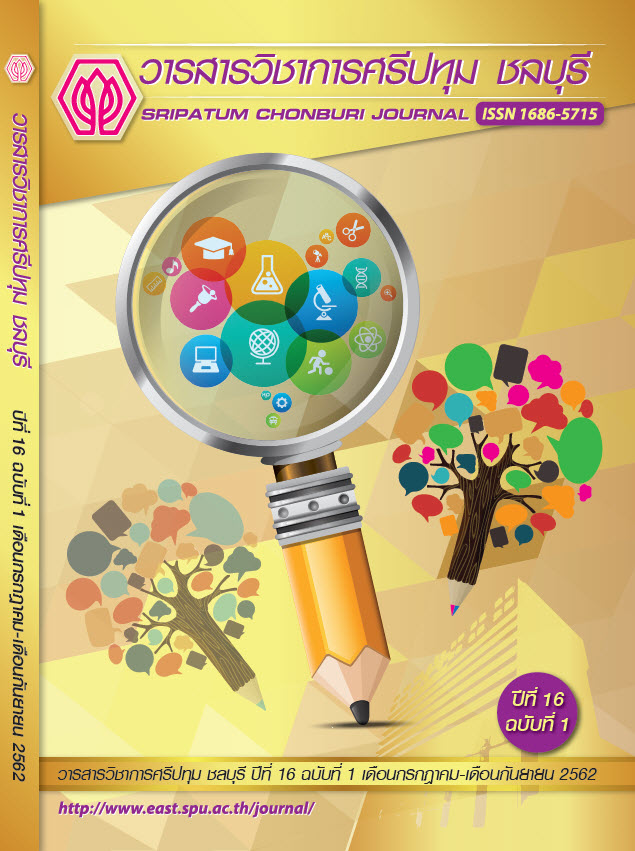CORPORATE REPUTATION, ENVIRONMENT-RELATED PERSONAL TRAITS, AND DEMOGRAPHIC FACTOR AFFECTING CONSUMER BEHAVIOR IN ENVIRONMENTALLY FRIENDLY PRODUCT
Keywords:
corporate reputation, environment-related personal traits, consumer behavior, environmentally friendly productAbstract
This research aimed to study the influence of corporate reputation, environment-related personal traits, and demographic factor on consumer behavior in the environmentally friendly product. The research used the questionnaire as the research tool for data collection. The sample was 389 customers who bought the environmentally friendly products in Phetchabun by purposive sampling method. The research apply descriptive statistics and partial least squares analysis to examine the effect of the independent variables on the dependent variable. The research results revealed that: (1) the majority of respondents were below 30 years-old average and the largest percentage of income group was less than 40,000 Baht per month, (2) the ultimate model of this study consisted of 3 independent variables included corporate reputation, Age, Income and the dependent variable was consumer satisfaction in environmentally friendly product, (3) all 3 independent variables of the final model had significantly influence consumer behavior in environmentally friendly product and could explain the variances of dependent variable by 12.10 percent, and (4) the main finding of this research was the key factors that affected the consumer behavior in environmentally friendly product including corporate reputation in terms of consumer CSR, the information disclosure for consumer, the reliable information for consumer, the accurate information for consumer, consumer age and income.
References
6(1), pp. 157-166.
Chaimankong, B., et al. (2012). The antecedents of consumer trust on environmental friendly products:
The evidence from Thailand. MUT Journal of Business Administration, 9(2), pp. 166-189.
Cochran, W. G. (1977). Sampling techniques (3rd ed.). New York, NY: John Willey and Sons.
Feldman, P. M., Bahamonde, R. A., & Bellido, I. V. (2014). A new approach for measuring corporate
reputation. Revista de Administracao de Empresas, 54(1), pp. 53-66.
Garson, G. D. (2016). Partial least squares: Regression and structural equation models. Raleigh, NC:
Statistical Associates Publishing.
Hair, J. F., et al. (2014). Multivariate data analysis (7th ed.). Edinburgh Gate, UK: Pearson Education.
_______. (2017). A primer on partial least squares structural equation modeling (PLS-SEM) (2nd
ed.). Thousand Oaks, CA: Sage.
Kabadayi, E. T., et al. (2015). Green purchase intention of young Turkish consumers: Effects of
consumers’ guilt, self-monitoring and perceived consumer effectiveness. Procedia-Social and
Behavioral Sciences, 207, pp. 165–174.
Kaur, M., & Bhatia, A. (2018). The impact of consumer awareness on buying behavior of green
products. International Journal of Scientific Research and Management, 6(4), pp. 250–255.
Khaniwale, M. (2015). Consumer buying behavior. International Journal of Innovation and Scientific
Research, 14(2), pp. 278–286.
Lii, Y. S. (2011). The effect of corporate social responsibility (CSR) initiatives on consumers’
identification with companies. African Journal of Business Management, 5(5), pp. 1642–1649.
Lin, C. P., et al. (2011). Understanding purchase intention during product-harm crises: Moderating
effects of perceived corporate ability and corporate social responsibility. Journal of Business
Ethics, 102, pp. 455–471.
Nath, V., et al. (2013). Consumer adoption of green products: Modeling the enablers. Global Business
Review, 14(3), pp. 453-470.
Rawat, S. R. (2015). Impact of age and income over green consumer behavior. Indian Journal of
Science and Technology, 8(S4), pp. 13-22.
Solino, M., & Farizo, B. A. (2014). Personal traits underlying environmental preferences: A discrete
choice experiment. PLoS ONE, 9(2), pp. 1-7.
Yazdanifard, R., & Mercy, I. E. (2011). The impact of green marketing on customer satisfaction and
environmental safety. International Conference on Computer Communication and
Management, Proc. of CSIT, 5, pp. 637-641.
Zia, A. (2012). Eco-friendly marketing and consumer buying behavior: An empirical study.
International Journal of Research in Computer Application and Management, 2(4), pp. 131-144.
Downloads
Published
Issue
Section
License
บทความทุกบทความเป็นลิขสิทธิ์ของวารสารวิชาการศรีปทุม ชลบุรี



